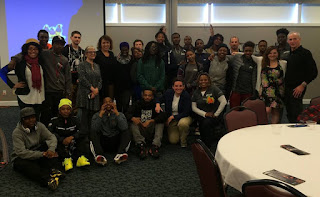To those who think anxiety isn't real...
After a year and a half of hospitalizations,
misdiagnoses, countless medication changes, and many unanswered questions, I
was fortunate enough to get an evaluation appointment with one of the best
mental health specialists in the country. My parents and I drove 6 hours south
to meet this doctor to hear his opinions on my diagnosis and future treatment.
The evaluation process took more than 5 hours. At the end of the day, the
doctor said, “There is no need for her to be on antipsychotic medication
because she actually has a severe anxiety disorder.”
My parents were so happy to hear this prognosis, and
everything the doctor explained about the onset, symptoms, and reactions I had to
medications made sense. At the time, I couldn’t wrap my head around the idea
that I had an anxiety disorder because I didn’t understand how the severity of
what I was going through was a term I heard people say every day. Many times
people use the word anxiety when they
are describing feeling stressed or nervous about something. When I heard the
doctor say “anxiety disorder,” I thought he meant that I was just a nervous
person. After learning more about anxiety disorders, I realized that they are
real psychiatric disorders that can consume and change someone’s life and
future.
An issue I’ve seen many times for people with anxiety
disorders is others’ belief that anxiety isn’t real. When people are dealing
with anxiety, one of the most damaging statements they can hear is that they
are making it up or exaggerating their feelings. Some common examples are
phrases like:
“Everyone gets stressed.”
“All students go through this at the end of the
semester.”
“You just need more sleep.”
“She’s just trying to get attention.”
As a woman with an anxiety disorder who also has
friends and family with anxiety, I’ve heard countless versions of these
statements from peers as well as respected adults. I usually don’t dwell on the
limitations I’ve had to deal with due to my disorder, but what I’ve faced over
the past few years illustrates that anxiety is real, and it should not be taken
lightly. For those who think I’m “doing it for attention,” consider this:
I gave up my privilege to drive at night because I
became afraid of driving in the dark. I had to change the career path that I
wanted since the 7th grade because I knew the job environment would
trigger my anxiety. Why would I want to leave the part time job I had loved for
5 years? Why would I throw away three years of college after being so close to
getting my teaching degree? Why would I want to spend 3 months in the hospital
away from my friends, family, and brand new kitten? Why would I spend
Thanksgiving in a hospital over 3 hours away from my family? Why would I want
to take medications after living my whole life drug and alcohol free? Why would
I stay home from my best friend’s bachelorette party in Atlantic City? Why
would I want to face mental health stigma? I have to see people graduate
college, get their dream jobs, buy their first houses, and take spontaneous
trips just because they want to. Why wouldn’t I want to experience those things
too?
This is how anxiety has impacted my life. I’m not
using anxiety as an excuse to skip school, get out of a test I forgot to study
for, get extra time on a paper I put off doing, leave work early, or avoid my
adult responsibilities. When people use the word anxiety as an excuse, it essentially tells the world that people
with diagnosed anxiety disorders can turn it on and off and are just
exaggerating their symptoms. Nobody would want to go through a battle with
mental illness if they had the choice. We are not doing it for attention.
Anxiety is a disorder, not a decision.

Comments
Post a Comment